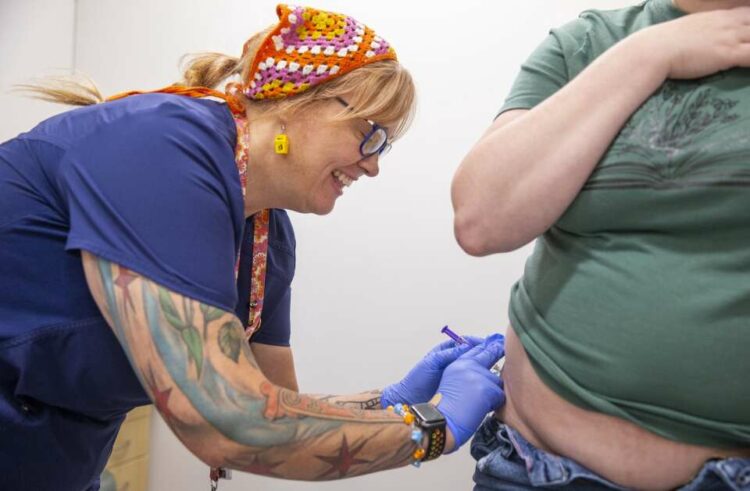Iowa abortion ban: New Iowa legislation restricts abortion access after six weeks, forcing patients to seek care out of state.Minnesota’s role: Planned Parenthood clinic in Mankato, Minnesota, is seeing an increase in patients from Iowa and other restrictive states.Impact on providers: Out-of-state clinics like Mankato are expanding services and hiring more staff to meet rising demand from Iowa patients.Staff insights: Medical professionals at the clinic highlighted the challenges posed by Iowa’s ban, including the strain on low-income and marginalized communities.Patient struggles: Iowa patients face financial and logistical barriers, including travel and accessing abortion care before the six-week deadline.National landscape: Abortion rates have increased nationwide despite bans, driven by expanded access to telehealth and medication abortion.
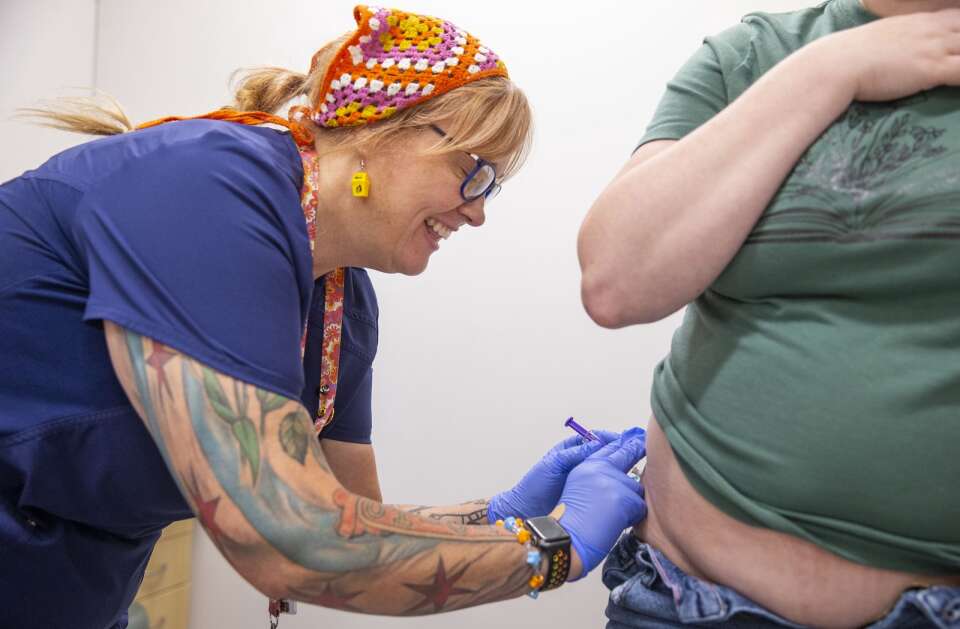
Certified clinical medical assistant Chelsea Morning gives an intra-articular birth control shot to a patient Aug. 30 at a Planned Parenthood clinic in Mankato, Minn. Planned Parenthood provides services at the Mankato location including wellness exams, medication abortions, birth control and family planning services. (Savannah Blake/The Gazette)
Editor’s note: Iowa legislation that took effect in July restricts abortion access in Iowa. To understand how this change has affected Iowans seeking abortion care, The Gazette traveled to a Planned Parenthood clinic in Mankato, Minn., which has seen an increase in patients traveling from states that have reduced abortion availability since Roe v. Wade was overturned in 2022. The Gazette’s Deputy Des Moines Bureau Chief Tom Barton and photojournalist Savannah Blake spent part of Aug. 30 at the clinic, speaking to providers and patients about the changes.
MANKATO, Minn. — A carload of teens drove hours, staring at miles upon miles of farm fields and row upon row of rotating wind turbine blades before pulling into a parking lot just down the street from Minnesota State University.
They parked in front of a three-story commercial building with loft apartments above and a liquor store, smoke shop and Planned Parenthood clinic below.
They walked into the clinic and nervously sat in the small waiting room. Miniature LGBTQ and transgender pride flags were strung between potted plants.
Among the group was a pregnant transgender teen who traveled with older siblings and friends to seek an abortion. They crossed the border from South Dakota, where abortion is banned with limited exceptions after the state became one of the first in the nation to respond to the 2022 U.S. Supreme Court ruling that overturned the 50-year federal right to an abortion guaranteed under Roe v. Wade. The decision gave states the authority to enact their own abortion laws, creating a fractured patchwork of abortion policies across the country.
There are no restrictions on abortion in Minnesota after statehouse Democrats passed new legislation in 2023. The measure enshrined the right to an abortion and other reproductive health care services into state law. A state shield law is meant to protect abortion providers from investigations by other states.
“It just broke my heart that they didn’t have the support in their home state or in their actual home life,” said Chelsea Morning, a certified clinical medical assistant at the Mankato clinic, who retold the story to The Gazette during a recent tour.
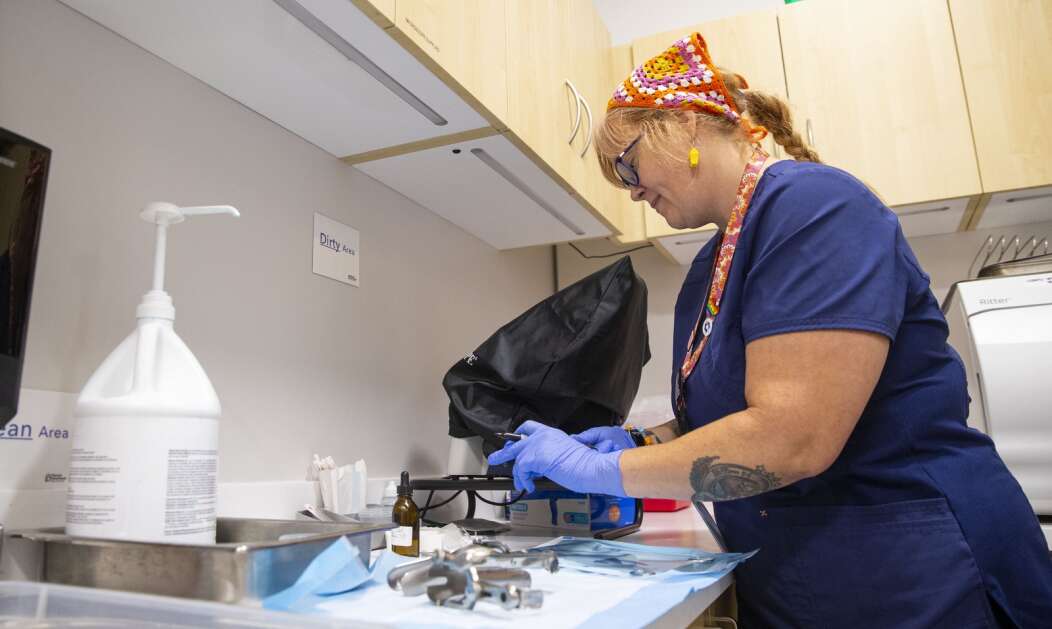
Certified clinical medical assistant Chelsea Morning works Aug. 30 on sanitizing exam tools while waiting for her next patient at Planned Parenthood in Mankato, Minn. (Savannah Blake/The Gazette)
Morning emphasized the Minnesota clinic complied with state laws and regulations. A legal team ensures staff adhere to state requirements while providing the best possible care, clinic officials said.
Transgender and nonbinary people assigned female organs at birth, or are intersex, can become pregnant. Research suggests those who identify as LGBTQ are at a greater risk of unintended pregnancy, partially because they are less likely to use contraceptives. LGBTQ people also are at increased risk for sexual and physical intimate partner violence, and are more likely to need abortion services as well, according to the Human Rights Campaign Foundation, the educational arm of the nation’s largest lesbian, gay, bisexual, transgender and queer civil rights organization.
Planned Parenthood registered nurse Gabrielle Smith said the case highlights the broader implications and consequences of restrictive abortion laws and the burdens placed on patients to seek health care.
“For a variety of reasons, continuing a pregnancy would be very likely to be life-threatening, either due to gender dysphoria or just realistically, you know, a very young … patient physically carrying that pregnancy would be difficult — physically, mentally, emotionally,” Smith said. “And then siblings and friends were having to kind of witness that and understand that it was up to them as people also underage to help this person, rather than being able to rely on an adult.”
An ‘ever-shifting’ landscape
Ruth Richardson, president and chief executive officer of Planned Parenthood North Central States, said the organization has seen an influx of out-of-state patients — including from Iowa — at its Minnesota clinics, especially from rural areas with limited access to reproductive health services, since the 2022 ruling.
Fourteen states now have a ban on abortion with narrow exceptions in place. And Iowa recently became the fourth state to ban most abortions as early as six weeks of pregnancy, before many women know they are pregnant, with limited exceptions in the cases of rape, incest or to save the life of the patient.
The Iowa law, which took effect July 29, has caused Iowans to leave the state for abortion care, navigate a self-managed abortion or carry an unwanted pregnancy to term. That’s placed strain on abortion providers like Planned Parenthood to accommodate patients traveling from states that have restrictive abortion laws, and created large financial and logistical hurdles to travel to receive care.

Ruth Richardson, president and CEO of Planned Parenthood North Central States
“I think one of the biggest challenges is just the ever-shifting landscape of what’s happening,” Richardson said. “Because it can be really difficult to know what is legal on any given day.”
The Gazette traveled to the Mankato clinic, an hour’s drive from Iowa and about four hours from Cedar Rapids, to assess how the new Iowa law is impacting patients and providers. Planned Parenthood leaders said they do not yet have specific numbers, but have seen more Iowa residents traveling to Mankato and Rochester, Minn., to receive reproductive health services.
“The border communities have become so important within this space, and here in Mankato, for example, we expanded to offer medication abortion in January of this year after relocating to this bigger space” last year, Richardson said.
Planned Parenthood also is in the midst of an expansion that will triple the number of exam rooms at its Omaha, Neb., clinic. Richardson said she anticipates work will be completed later this year.
Richardson emphasized the impact bans have on low-income and marginalized communities, particularly Black Iowans, who are at a higher risk of maternal mortality. “I just think it’s important as we have these conversations to continue to lift up the reality that abortion bans do not ban abortions for everyone,” she said. “They ban abortions for people who don’t have the means or the opportunity to travel.”
Out-of-state clinics working to expand
Misty Parrow, senior health center manager at Planned Parenthood North Central States, provides support to multiple health centers across a five-state region in Iowa, Minnesota, Nebraska and the Dakotas.
Parrow said the Mankato clinic started out seeing about eight patients weekly, and now sees about 15 a week. She said the clinic intends to increase capacity to 22 to 25 patients per week by the end of September, and is hiring additional staff.
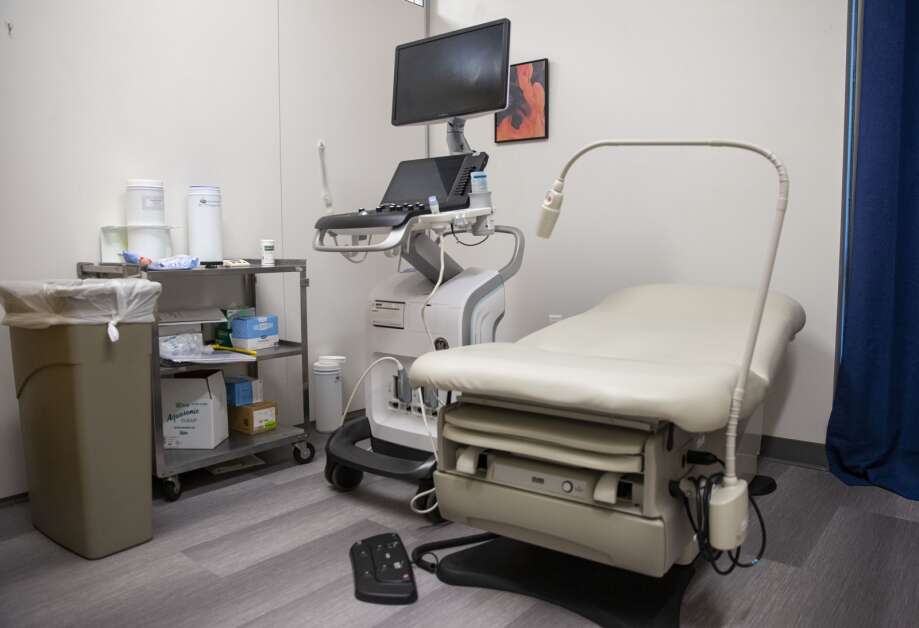
An exam room at the Planned Parenthood clinic in Mankato, Minn., pictured Aug. 30, features ultrasound equipment. The clinic now sees about 15 patients a week and intends to expand to 22 to 25 patients a week this fall. (Savannah Blake/The Gazette)
She said Planned Parenthood has posted and hired for 25 to 30 positions across five Midwest clinics since May. The Mankato clinic has two providers and is hiring for another, with floating providers to cover additional needs.
Providers are in high demand and the clinic is often over capacity, but the clinic is committed to accommodating patients, Parrow said.
“In Rochester (and) Mankato, we can typically do same week (appointments). In Omaha, it’s about three weeks (wait),” she said.
The new Mankato clinic is larger, with five exam rooms. Parrow said the move was planned to accommodate the expected increase in abortion patients from other states.
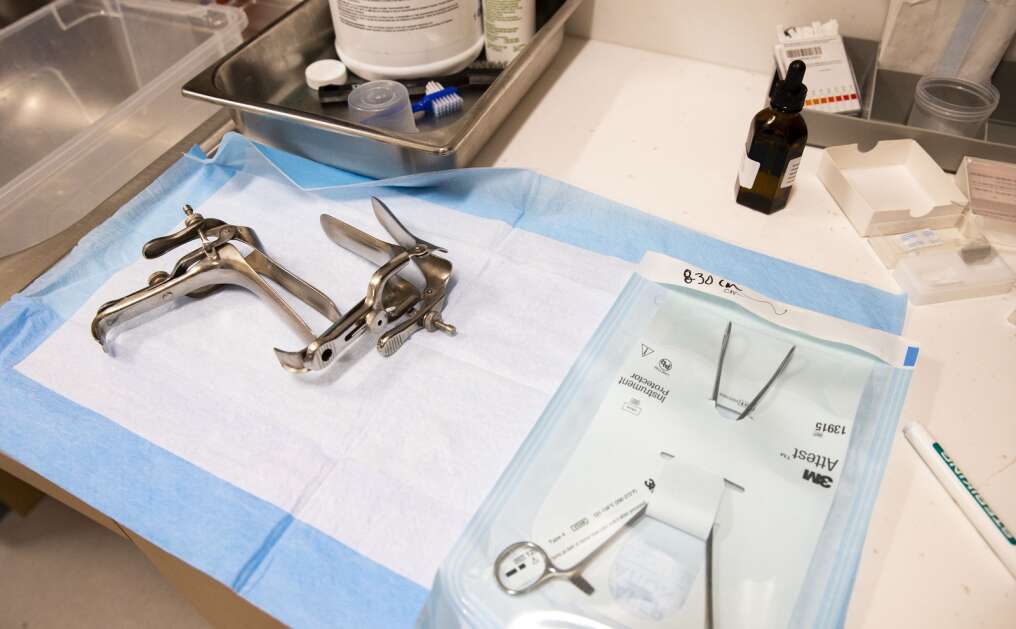
Exam tools sit out to be sanitized Aug. 30 at the Planned Parenthood clinic in Mankato, Minn. (Savannah Blake/The Gazette)
She said the Iowa abortion ban has required significant staffing increases and cross-training. Iowa patients have been proactive in seeking care due to legislative changes, and Planned Parenthood has seen a shift with more Iowa patients seeking care earlier, Parrow said.
“I would say right around six weeks before the Iowa Supreme Court decision came out — where typically it was pretty common to see patients come in right around that nine — 10 week mark of pregnancy for an abortion — really quickly we started to see patients that were, you know, three, four, five weeks pregnant coming in,” she said. “They were trying to do what they could to make sure they were going to get the care that they needed.”
Planned Parenthood reduces abortion services in Iowa
Since the Iowa law took effect, Planned Parenthood has adjusted its operations in the state, focusing on preventive care, wellness and family planning. That includes exams, birth control, sexually transmitted infections testing and treatment, cancer screenings and mental health.
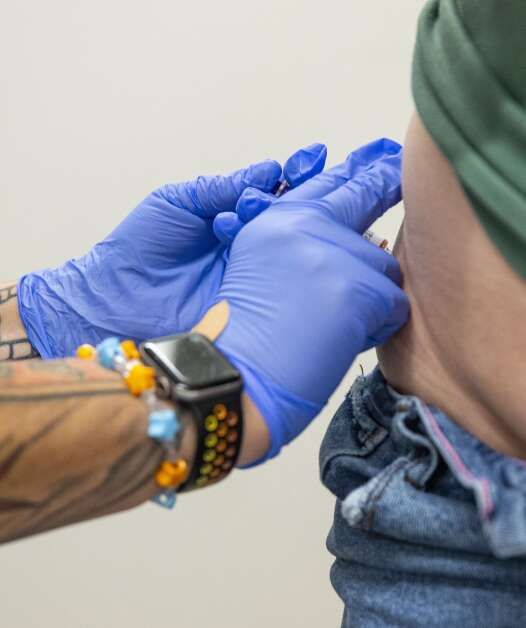
Certified clinical medical assistant Chelsea Morning gives an intra-articular birth control shot Aug. 30 to a patient at the Planned Parenthood clinic in Mankato, Minn. (Savannah Blake/The Gazette)
Planned Parenthood North Central States and the Emma Goldman Clinic in Iowa City said their organizations will continue to provide abortion services in Iowa in compliance with the law.
Planned Parenthood’s Ames locations is now its only clinic in Iowa offering abortion services, including in-person procedures and medication abortion. Planned Parenthood no longer is providing medication abortion at clinics in Des Moines, Iowa City and Sioux City.
Medication and in-clinic abortion are offered just over the state line in Omaha.
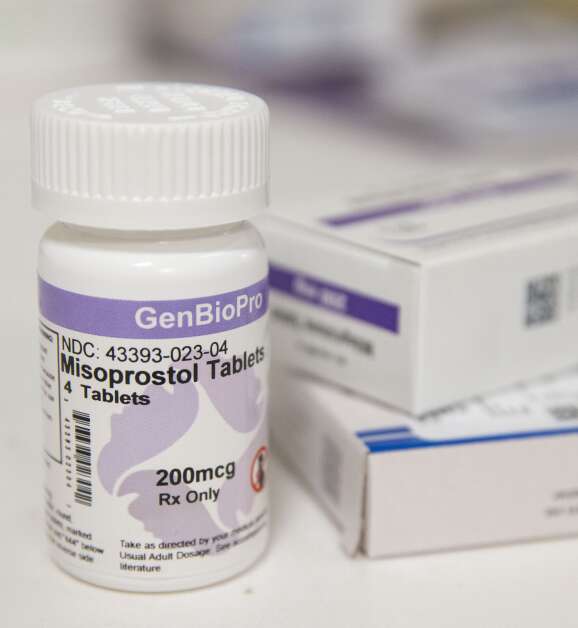
Misoprostol tablets used for a medication abortion are shown Aug. 30 at the Planned Parenthood clinic in Mankato, Minn. (Savannah Blake/The Gazette)
Abortion opponent: ‘Our goal is to protect women’
Reduced access to abortion clinics has been part of abortion opponents’ longtime effort to eliminate the “abortion industry” in Iowa, Pulse Life Advocates Executive Director Maggie DeWitte said.
“Our goal is to protect women. We want to help women in unplanned pregnancies. We want them to know that they have choices other than abortion,” DeWitte previously told The Gazette. “Our goal has been and will continue to be to educate on the sanctity of human life. … We want to work tirelessly and endlessly until we have eliminated abortion from our state.”
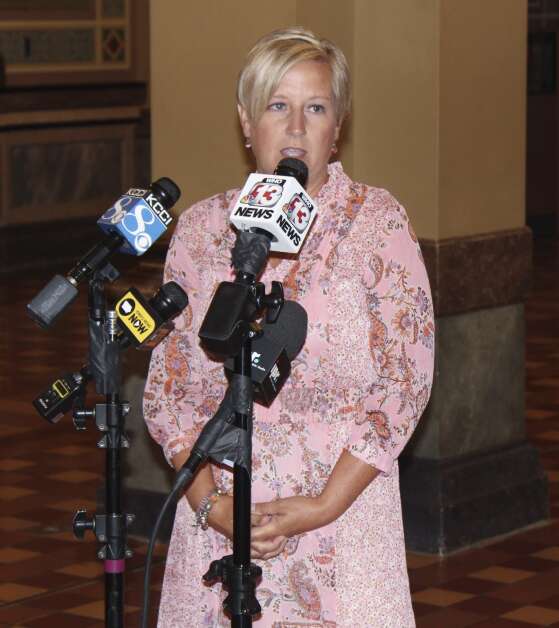
Maggie DeWitte, executive director of the anti-abortion rights advocacy group Pulse Life Advocates, speaks to reporters June 30 at the Iowa Capitol in Des Moines. (Erin Murphy/The Gazette)
Iowa Gov. Kim Reynolds earlier this year signed into law legislation extending coverage of postpartum care for new moms under Medicaid from 60 days required under federal law to 12 months. But in doing so, the law increased income restrictions on eligible families to make it budget neutral — meaning about 1,700 fewer women and infants will be covered each month.
Republican lawmakers last year also increased state funding, from $500,000 to $2 million, to non-medically licensed crisis pregnancy centers that provide education, support and services for pregnant women and discourage abortion, often run by religious organizations. The centers, which support services to pregnant people like ultrasounds and counseling that encourages them to choose childbirth, can recommend terminating a pregnancy only if it’s “medically necessary to prevent the pregnant woman’s death.”
How does medication abortion work?

Misoprostol and mifepristone tablets used for a medication abortion are shown Aug. 30 at the Planned Parenthood clinic in Mankato, Minn. (Savannah Blake/The Gazette)
Individuals can receive abortion pills via telehealth in Minnesota. However, the provision is contingent on the patient’s physical location in the state at the time of care. That means Iowa patients must travel to a clinic or instead rely on a makeshift national network of clinic navigators, abortion fund leaders and individual volunteers to receive abortion pills and aftercare care kits by mail.
The Mankato clinic works with patient navigators and independent abortion funds to assist patients with lodging, transportation and other expenses.
Planned Parenthood offers the abortion pill up to 11 weeks of pregnancy by appointment only. Clinic staff schedule follow up appointments for procedural abortions at its nearest clinic for patients found to be over 11 weeks pregnant.
Marcus Hinkley, health center manager, said staff have discussed expanding medication abortion services to another day of the week to accommodate increasing demand. Currently, the clinic schedules medication abortions on Wednesdays.
A medication abortion is similar to an early miscarriage and is done using two medications, mifepristone and misoprostol. Mifepristone stops development of the pregnancy and begins the abortion process. Misoprostol, usually taken 24 to 48 hours later, causes the uterus to contract and expel the pregnancy.
After taking the second medication, patients experience cramping and bleeding, often with clots, usually within two to six hours. Lighter bleeding and/or spotting can last up to four to six weeks after medication abortion. The medication may also cause fever, chills, nausea, vomiting or diarrhea.
“I have to tell patients that it is possible that … sometime in the first 24 hours after taking the second medication, the misoprostol, they may pass a blood clot up to the size of a lemon, or approximately their fist,” Smith, the clinic nurse said.
She said clinic staff ensure patients have a plan for post-abortion care and provide them information on how to manage symptoms, including taking over-the-counter medication to reduce fever and pain and control nausea.
“Many of our patients have traveled four, five, six hours by the time they get to us. They’re tired. They’re stressed. They’re overwhelmed,” Smith said. “And that’s at the start of the visit, and they know they face that same drive home afterward.
“It is hard to tell somebody that they are going to be potentially going through those symptom while they’re in a car or pulled over at a rest station, or while they’re at home and not being able to talk openly to seek the comfort and reassurance that they should be able to have.”
Ban forces ‘desperate’ Iowans to make quick decisions
Kristina Remus is a patient services associate with Planned Parenthood based in Minneapolis, who handles scheduling and patient inquiries for all its locations in Iowa, Minnesota, Nebraska and the Dakotas.
Since Iowa’s ban, Remus said patient services has seen a slight increase in calls, with many seeking to understand their options. That’s led to difficult conversations that often revolve around financial constraints and transportation.
She recalled a phone conversation with one patient struggling to afford paying rent and abortion care simultaneously. Others cannot afford to travel, with some patients lacking access to cars or public transportation. Patients, too, often struggle with missing work and informing their employers about abortion care.
The new law has caused patients to make quick decisions.
“I don’t think people truly understand kind of how strict it really is. I mean, most people don’t even test positive for pregnancy until they’re around five weeks,” Remus said, giving them a week or less “to get this whole emotional, intense, complicated situation figured out.”
She recalled speaking to a patient from Iowa seeking a medication abortion. The single mother worked full-time while raising four or five children. Remus said the woman was hoping to get a pregnancy test and leave with abortion pills on the same day, but was just beyond six weeks of pregnancy to qualify for an abortion under Iowa’s new law.
“I said, ‘This really is not a possibility. I’m really sorry, but we’re going to have to look at other states,’” she said.
The woman broke down in tears.
“She kept saying, like, ‘There’s nothing you can do? I’m so desperate. I’m so desperate.’ Like, just kept saying, ‘I’m so desperate.’”
Patients feel ‘hopeless’
Holly Thomas is an abortion patient navigator with Planned Parenthood. Thomas said navigators are experiencing a significant rise in patient caseloads, with 277 Iowa patients in July alone requesting assistance to travel out of state.
Many patients, Thomas said, feel a sense to hopelessness and anxiety, especially those in rural areas, who struggle to access health services.
“They’re telling us, ‘I don’t know where to go. I don’t know how to get there. I don’t know how to pay for it,’” she said. “Resources are not an endless well; it is limited. So that does create some challenges to our jobs … being able to kind of move the Tetris pieces to fall so that way patients can seek the health care that they’re wanting.”
Before the ban was enacted in Iowa, the Iowa Abortion Access Fund partnered with the Chicago Abortion Fund to provide a broader network financial support to Iowans seeking abortion care. It also reached out to partnering clinics in Minnesota and Illinois to ensure they were prepared for the increase of Iowans who would inevitably seek out-of-state care.
Lyz Lenz, who serves on the board of directors of the Iowa Abortion Access Fund, said such funds across the nation are experiencing a financial strain as more states enact abortion bans, which drives up demand for support from states with fewer restrictions. Lenz said the organization has increased fundraising efforts.
Who is getting abortions?
Smith, the nurse, said she has seen patients as young as 13 travel to the clinic to receive an abortion because of restrictions in their home state.
In many cases, the patients already have children, are unmarried and poor. Some struggle with substance use, mental health challenges and financial instability. Others have medical conditions or health complications that can lead to high-risk pregnancies.
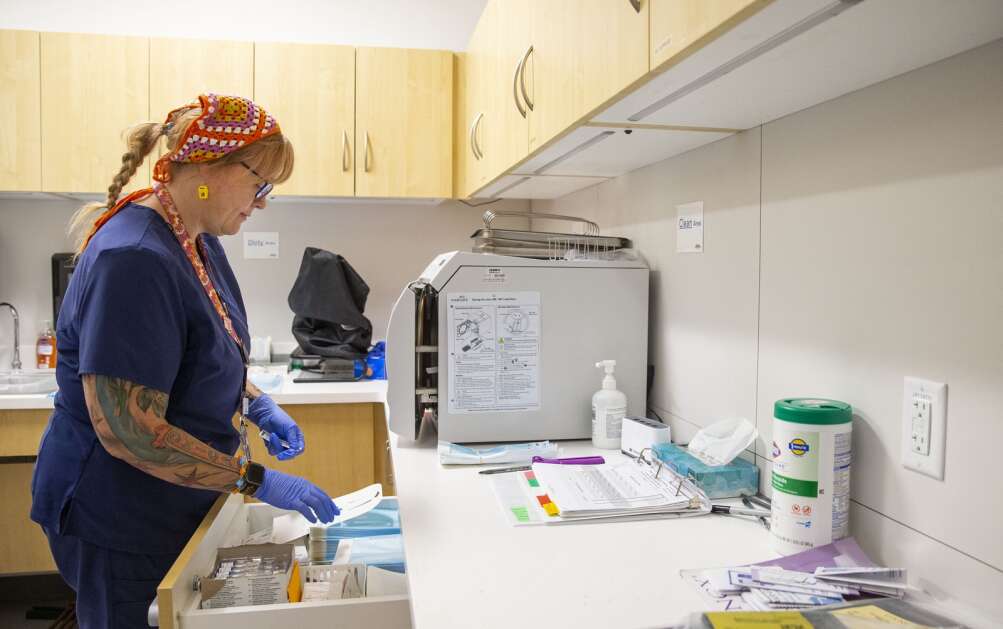
Certified clinical medical assistant Chelsea Morning works on sanitizing exam tools Aug. 30 while waiting for her next patient at the Planned Parenthood clinic in Mankato, Minn. (Savannah Blake/The Gazette)
In some cases, they have been diagnosed with cancer during their pregnancy, which could limit treatment options such as chemotherapy and radiation therapy.
“They’re having to make the decision to prioritize the families that they have — to take care of either their children’s medical needs, or in some cases their own medical needs,” Smith said. “ … We see older patients who maybe are mothers themselves. We see younger patients who want to be mothers in the future, and who are trying to prioritize knowing that a pregnancy right now wouldn’t be safe for them.”
An estimated 4,100 abortions took place in Iowa in 2023, which includes medication and surgical abortions, although demographic information of the patients was not included in the tracking by the Guttmacher Institute.
Nationally, six in 10 women who have abortions already are mothers, and half of them have two or more children, according to the latest data from the Centers for Disease Control and Prevention.
In 2021, women of various ages, socioeconomic status and racial and ethnic backgrounds obtained abortions, but the majority were obtained by women who were in their 20s, low-income and women of color.
Women in their 20s accounted for more than half of abortions. Nearly one-third were among women in their 30s and a small share were among women in their 40s (4 percent) and teens (8 percent). Black women comprised 42 percent of abortion recipients, 30 percent were White, 22 percent were Hispanic and 7 percent were other races or ethnicities.
The latest estimate from the Guttmacher Institute found that 25 percent of women will have an abortion by the end of their childbearing years.
Comments: (319) 398-8499; tom.barton@thegazette.com
Source link : http://www.bing.com/news/apiclick.aspx?ref=FexRss&aid=&tid=66dd801eab624eec9b0eef1afcea9840&url=https%3A%2F%2Fwww.thegazette.com%2Fstate-government%2Fminnesota-planned-parenthood-clinic-expands-as-more-iowans-travel-to-seek-abortions%2F&c=934114591644363909&mkt=en-us
Author :
Publish date : 2024-09-07 23:30:00
Copyright for syndicated content belongs to the linked Source.
